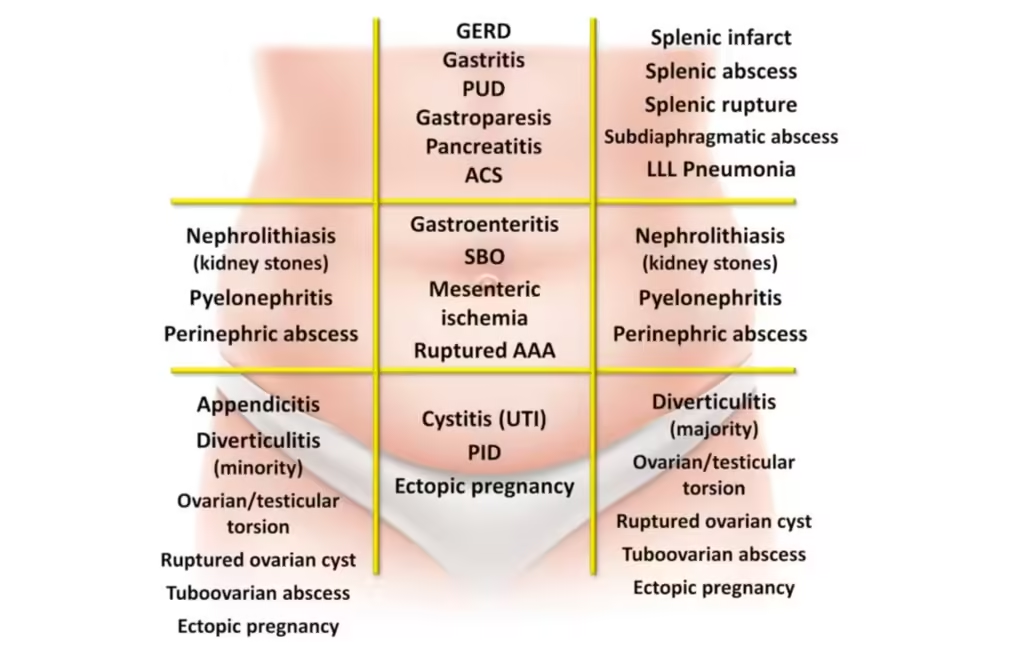Medically reviewed by Dr Itender Pal Singh
Upper stomach pain can range from mildly uncomfortable to severe pain which can make you affect your daily chores. While many people experience this pain due to simple causes like gas or indigestion, there are serious underlying conditions that require immediate medical attention. Knowing when to wait it out and when to seek help can make all the difference.
In This Article-
Here are the top 10 causes of upper stomach pain, how to treat them, and when you should contact a doctor.
1. Gas
Gas naturally builds up in the digestive system, but when it accumulates, it can cause bloating, pressure, and discomfort. This is a frequent reason for upper stomach pain, and while it’s usually harmless, it can feel unbearable.
Symptoms:
- Bloating and fullness
- A tight, pressurized sensation
Quick Fixes:
- Gas generally resolves itself within a few hours. Over-the-counter (OTC) remedies like simethicone can speed things up.
- Eating more slowly helps avoid swallowing excess air, which can prevent gas from worsening.
- If gas is accompanied by fever, vomiting, or severe pain, it’s time to see a doctor.
2. Indigestion: Burning Discomfort in the Upper Abdomen
Indigestion, or dyspepsia, occurs when stomach acid becomes too much for your digestive system to handle. It’s especially common after eating acidic foods and can result in a burning sensation.
Symptoms:
- Burning pain in the upper stomach, chest, or throat
- A feeling of fullness after eating
Solutions:
- OTC antacids work wonders for occasional indigestion.
- Identify and avoid trigger foods, such as spicy or acidic dishes.
- If indigestion becomes frequent, it could signal a more serious issue like acid reflux, ulcers, or even stomach cancer.
3. Gastritis: When Stomach Lining Swells and Hurts
Gastritis happens when the stomach lining becomes inflamed, often due to an infection by Helicobacter pylori bacteria. However, chronic conditions like autoimmune diseases can also cause gastritis.
Symptoms:
- Sudden or severe stomach pain
- Nausea and vomiting
Treatment:
- Antibiotics are usually effective if the cause is bacterial.
- For chronic gastritis, addressing the root cause—whether it’s an autoimmune issue, allergies, or chronic NSAID use—can prevent flare-ups.

4. Stomach Viruses: Gastroenteritis
Gastroenteritis, commonly referred to as the stomach flu, is a viral infection that causes inflammation in the digestive system. It’s not actually a flu but feels just as miserable.
Symptoms:
- Nausea, vomiting, and diarrhea
- Upper stomach pain
Recovery Tips:
- Stay hydrated with electrolyte solutions to avoid dehydration.
- Avoid solid food until the vomiting stops, then slowly introduce bland foods.
- Most cases resolve within a few days, but persistent symptoms may require medical attention.
5. Muscle Pain
Surprisingly, upper stomach pain isn’t always from your stomach—sometimes it’s muscle pain. Whether due to a workout, heavy lifting, or poor posture, strained muscles can cause discomfort in the upper abdominal area.
Signs:
- Localized pain that worsens with movement or touch
Relief:
- Rest and gentle massage can help soothe muscle tension.
- Alternating hot and cold packs can reduce inflammation and relax the muscles.
6. Appendicitis
Appendicitis occurs when the appendix becomes inflamed and infected, requiring immediate medical intervention. This condition can initially cause upper stomach pain, but as the infection worsens, the pain shifts to the lower-right abdomen.
Symptoms:
- Pain starting around the belly button and migrating to the lower-right side
- Fever, nausea, and vomiting
Action Plan:
- Go to the emergency room immediately if you suspect appendicitis. A ruptured appendix can be life-threatening.
7. Gallstones
Gallstones form when cholesterol or bilirubin hardens in the gallbladder. They can block bile ducts, causing severe upper-right stomach pain.
Symptoms:
- Sharp pain in the upper-right abdomen
- Vomiting and fatigue
Solutions:
- Surgery is often necessary if gallstones block the ducts. In some cases, an endoscopic procedure (ERCP) is used to remove stones blocking the bile duct.
- A gallbladder removal may be required if gallstones become a recurring issue.
8. Liver or Pancreas Issues
The liver, pancreas, and gallbladder work in sync to aid digestion. If one of these organs malfunctions, it can cause significant upper stomach pain. Conditions like hepatitis or pancreatitis often result in this discomfort.
Symptoms:
- Pain in the upper-right side of the stomach
- Jaundice, vomiting, and fatigue
Treatment Options:
- Pancreatitis may require hospitalization for fluids and monitoring.
- Liver conditions like hepatitis need medication, and in severe cases, a liver transplant might be required.
9. Bowel Obstruction: A Medical Emergency
When the intestines are blocked, it’s impossible for food or waste to move through the digestive system. A bowel obstruction causes extreme pain and is considered a medical emergency.
Symptoms:
- Severe abdominal pain and bloating
- Constipation and inability to pass gas
Immediate Actions:
- Seek emergency medical care. Surgery may be needed to clear the blockage.
- Medications and fluids will likely be administered in the hospital to stabilize the condition.
10. Diverticular Disease
Diverticulosis refers to the formation of small pouches in the intestines, and diverticulitis is when these pouches become inflamed or infected, leading to severe pain in the abdomen.
Symptoms:
- Sharp pain in the abdomen (location depends on which part of the intestine is affected)
- Fever and nausea
Treatment:
- A high-fiber diet and probiotics often help manage the symptoms.
- While antibiotics are the traditional treatment, newer recommendations suggest supportive care for uncomplicated cases.
- Severe infections may require surgery to remove the affected part of the intestine.

When to See a Doctor for Upper Stomach Pain
Most cases of upper stomach pain aren’t life-threatening and resolve on their own. However, there are situations where medical attention is crucial.
Visit a Doctor Within 24 Hours if Upper Stomach Pain is Accompanied by:
- Vomiting lasts longer than 12 hours
- Fever accompanies the pain
- Stomach pain follows an injury
- Pain occurs after taking a new medication
- You have a weakened immune system
Go to the ER or Urgent Care if:
- The pain is unbearable
- You have upper-right abdominal pain with pale stool
- Severe dehydration symptoms occur, such as dry mouth, dizziness, or sunken eyes
- A pregnant woman experiences intense stomach pain
Don’t Ignore Stomach Pain—Your Body’s Trying to Tell You Something
Upper stomach pain can stem from a wide variety of causes, ranging from mild gas to serious conditions like appendicitis or gallstones. By paying attention to your body’s signals and getting medical help when necessary, you can ensure that you’re not just treating the symptoms but addressing the underlying cause. Most importantly, if you ever find yourself in extreme pain or discomfort, don’t hesitate to seek professional medical advice.
If upper stomach pain persists, gets worse, or comes with alarming symptoms, it’s always better to err on the side of caution and consult a doctor.
SOURCES-
We have a very strict reviewing guidelines on how to run every article in the website. Everything we write follow a very strict reviewing process by following high quality peer-reviewed studies. Every source we follow are credible and accurate and again reviewed by our doctors to give you all high quality advise and content.
Harrison Manual Of Internal Medicine.
Gastritis.
https://www.niddk.nih.gov/health-information/digestive-diseases/gastritis
Symptoms & causes of appendicitis. (2021).
https://www.niddk.nih.gov/health-information/digestive-diseases/appendicitis/symptoms-causes
Merck Manuals: “Acute Abdominal Pain,” “Overview of Inflammatory Bowel Disease (IBD).”
Johns Hopkins Medicine: “Why Does My Stomach Hurt?
Brigham and Women’s Hospital: “Gas: Beat The Bloat.”
Cleveland Clinic: “Abdominal Pain,” “Miscarriage,” “Abdominal Pain: Care and Treatment,” “Indigestion,” “Gas and Gas Pain,” “Constipation,” “Diarrhea,” “Food Intolerances,” “Food Poisoning,” “Diverticulitis,” “Food Allergy vs. Intolerance: What’s the Difference?” “Mesenteric Ischemia,” “Stomach.”
For the latest health trending topics and top of the line updated health and fitness related news and conditions with insights from board certified experienced health professionals, follow Healing Doctor on Facebook, Instagram and Whatsapp.



